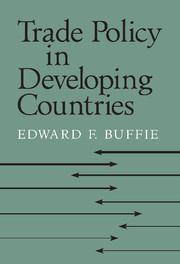Book contents
- Frontmatter
- Contents
- 1 Introduction
- 2 Tools and Tricks of the Trade, Part I: Duality Theory
- 3 The Trade Policy Debate
- 4 Tools and Tricks of the Trade, Part II: Linear Differential Equations and Dynamic Optimization
- 5 Underemployment, Underinvestment, and Optimal Trade Policy
- 6 Liberalization and the Transition Problem, Part I: Transitory Unemployment
- 7 Tools and Tricks of the Trade, Part III: The Dynamics of Temporary Shocks
- 8 Liberalization and the Transition Problem, Part II: Credibility and the Balance of Payments
- 9 Direct Foreign Investment, Economic Development, and Welfare
- 10 Suggestions for Future Research
- References
- Index
10 - Suggestions for Future Research
Published online by Cambridge University Press: 29 July 2009
- Frontmatter
- Contents
- 1 Introduction
- 2 Tools and Tricks of the Trade, Part I: Duality Theory
- 3 The Trade Policy Debate
- 4 Tools and Tricks of the Trade, Part II: Linear Differential Equations and Dynamic Optimization
- 5 Underemployment, Underinvestment, and Optimal Trade Policy
- 6 Liberalization and the Transition Problem, Part I: Transitory Unemployment
- 7 Tools and Tricks of the Trade, Part III: The Dynamics of Temporary Shocks
- 8 Liberalization and the Transition Problem, Part II: Credibility and the Balance of Payments
- 9 Direct Foreign Investment, Economic Development, and Welfare
- 10 Suggestions for Future Research
- References
- Index
Summary
The concluding sections of Chapters 3, 5, 6, 8, and 9 summarize what the book has to say about various aspects of the trade policy debate in developing countries. Rather than cover that ground again in slightly different language, I will bring matters to a close by emphasizing that a good deal of additional work is needed in the areas of optimal commercial policy, liberalization, and direct foreign investment to complete the research program started here.
Optimal Commercial Policy
The analysis of optimal commercial policy in Chapter 5 assumed that exports were primary products (or lightly processed manufactured goods) and that high-wage employment was confined to the import-competing sector. It is desirable to relax these two assumptions. A significant minority of LDCs are now proficient exporters of manufactured goods, and in some parts of Latin America the high-wage sector includes large sections of the export sector and services in addition to import-competing manufacturing production.
No special adaptations of the model in Chapter 5 are required to analyze optimal commercial policy when the manufacturing export sector resides in the low-wage informal sector. This case can be handled simply by marking down the cost share of land and marking up the cost shares of labor and capital. I doubt if it would produce results appreciably different from those in Chapter 5.
The more challenging and more interesting case places manufactured exports in the high-wage formal sector.
- Type
- Chapter
- Information
- Trade Policy in Developing Countries , pp. 370 - 373Publisher: Cambridge University PressPrint publication year: 2001



